Why Cloud Contact Centers Matter in 2025
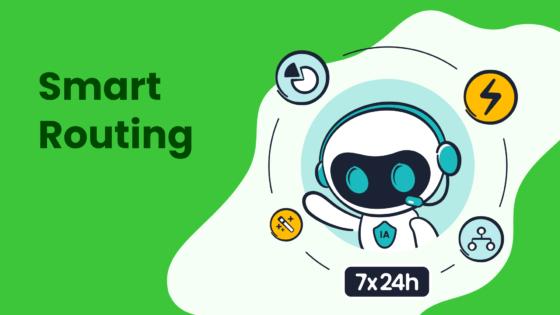
What is cloud contact center? It is a customer service solution hosted on the internet, allowing businesses to seamlessly manage customer interactions across multiple channels. Unlike traditional systems, it provides unparalleled scalability, flexibility, and advanced features such as AI integration. This innovation is crucial in 2025 as companies adapt to remote work and increasing customer expectations. With the market expected to grow from $27.22 billion in 2024 to $87.10 billion by 2029, cloud-based systems have become indispensable. Sobot equips businesses with state-of-the-art solutions to remain competitive in this ever-evolving landscape.
What is a Cloud Contact Center?
Definition and Core Purpose
A cloud contact center is a customer service platform hosted on the internet. It enables businesses to manage customer interactions across multiple channels, such as voice, email, chat, and social media, without relying on traditional on-premises systems. Unlike older systems, a cloud-based contact center offers flexibility, scalability, and advanced tools like AI and automation. These features help you deliver faster, more personalized support to your customers.
The core purpose of a cloud contact center is to streamline communication and improve customer experiences. By centralizing all interactions in one platform, it eliminates the inefficiencies of fragmented systems. For example, many organizations have reported significant improvements in customer satisfaction and operational efficiency after transitioning to cloud contact centers. Companies using Contact Center as a Service (CCaaS) have reduced setup times and costs while gaining access to essential features like call handling, reporting, and queue visualizations.
Did you know? Nearly 25% of businesses save $50,000 or more annually after integrating cloud contact center solutions. This cost efficiency makes it a game-changer for organizations of all sizes.
How Cloud Contact Centers Work
Cloud contact centers operate through internet-based infrastructure, eliminating the need for physical hardware. When you adopt a cloud-based contact center, your team can access the platform from anywhere with an internet connection. This flexibility supports remote work and distributed teams, which are increasingly common in 2025.
Here’s how it works:
- Customer Interaction: Customers reach out via their preferred channel, such as phone, email, or chat.
- Routing and Handling: The system uses intelligent routing to direct inquiries to the most suitable agent or department.
- AI and Automation: Automated tools, like chatbots and voicebots, handle repetitive queries, freeing agents to focus on complex issues.
- Unified Workspace: Agents access a single dashboard that consolidates customer data and interaction history, enabling personalized service.
- Analytics and Reporting: The platform tracks performance metrics, such as call resolution rates and customer satisfaction, to help you optimize operations.
Pro Tip: Over 40% of businesses manage more calls with the same or fewer agents after switching to a cloud contact center. This efficiency boost is one of the key reasons companies are making the shift.

Key Features of Sobot's Cloud Contact Center Solutions
Sobot's cloud contact center solutions stand out for their innovative features and proven results. Here’s what you can expect:
| Feature | Benefit |
|---|---|
| Intelligent IVR | Customize greetings and route calls efficiently. |
| AI-Powered Voicebot | Automate interactions and recognize customer intent. |
| Unified Workspace | Access all customer data and interactions in one place. |
| Global Number Availability | Support customers worldwide with local numbers. |
| Real-Time Monitoring | Track agent performance and call data instantly. |
| Seamless Integration | Connect with existing CRM and technology systems effortlessly. |
| 99.99% Uptime | Ensure reliable operations with high system stability. |
Sobot’s solutions also deliver measurable results. For instance, businesses using Sobot have achieved a 96%+ positive feedback rate and a 97% customer satisfaction score. The platform’s AI capabilities provide correct answers 80% of the time, reducing inbound discussion volume by 20%.
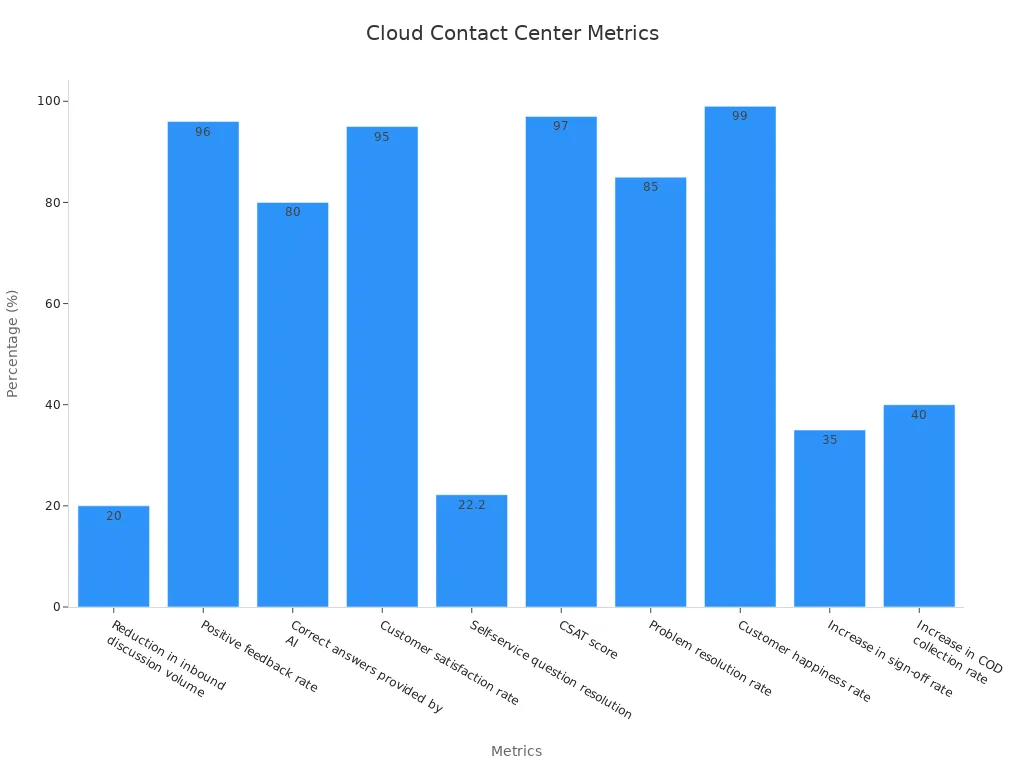
By choosing Sobot, you gain access to a comprehensive, scalable, and secure solution that adapts to your business needs. Whether you’re looking to reduce costs, improve efficiency, or enhance customer satisfaction, Sobot’s cloud contact center solutions have you covered.
Key Features of Cloud Contact Centers
Scalability and Flexibility
A cloud contact center offers unmatched scalability and flexibility, making it an essential tool for businesses in 2025. You can easily adjust resources to meet changing demands. For example, during peak seasons, you can add new communication lines with just a few clicks. This eliminates the need for complex hardware installations, which are common in traditional systems.
| Feature | Cloud Contact Center | Traditional Systems |
|---|---|---|
| Scalability | Near-infinite scalability; can add new lines in a few clicks | Each new line requires additional on-premise setup |
| Setup Time | Accelerated setup | Longer setup due to hardware installation |
| Reliability | Enterprise-level reliability with excellent uptime | Reliability depends on existing hardware, which will deteriorate over time |
| Cost Efficiency | Significant cost savings | Higher costs due to maintenance and upgrades |
This scalability and flexibility allow you to adapt quickly to market changes. Whether your team is growing or customer inquiries are increasing, a cloud contact center ensures you stay ahead without compromising efficiency.
Tip: Businesses using cloud contact centers report significant cost savings and faster deployment times compared to traditional call center technology.
Omnichannel Support for Seamless Customer Experience
Modern customers expect seamless interactions across multiple channels. A cloud contact center enables you to provide omnichannel communication, ensuring customers can reach you through their preferred platforms, such as voice, email, chat, or social media. This unified approach eliminates the frustration of switching between disconnected systems.
With omnichannel communication, your agents can access all customer interactions in one place. This unified workspace allows them to deliver personalized and efficient service. For example, if a customer starts a conversation on social media and later calls your support team, the agent can view the entire interaction history. This continuity enhances the customer experience and builds trust.
Note: Companies that adopt omnichannel solutions see a 30% improvement in customer satisfaction and loyalty.
By integrating all communication channels, you can streamline operations and reduce response times. This approach not only improves customer satisfaction but also boosts agent productivity.
AI and Automation Integration
AI-powered features are transforming the way businesses handle customer interactions. A cloud contact center leverages AI and automation to enhance efficiency and accuracy. For instance, AI-driven chatbots and voicebots can handle repetitive queries, allowing your agents to focus on complex issues. These tools also provide instant responses, reducing wait times for customers.
Automation goes beyond handling inquiries. It can route calls intelligently, ensuring customers connect with the right agent or department. Additionally, AI analyzes customer data to offer insights, helping you make informed decisions.
Pro Tip: AI-powered features in cloud contact centers can reduce inbound discussion volume by 20%, saving time and resources.
By integrating AI and automation, you can improve service quality while reducing operational costs. This combination of technology and efficiency makes cloud contact centers a game-changer for businesses aiming to stay competitive in 2025.
Remote Accessibility for Distributed Teams
Remote work has become the norm for many businesses, and a cloud contact center is the perfect solution for managing distributed teams. With internet-based infrastructure, your team can access the platform from anywhere. This flexibility ensures that agents remain productive, whether they work from home, a satellite office, or even another country.
A cloud contact center provides tools that make remote collaboration seamless. For example:
- Unified Dashboards: Agents can view customer data, interaction history, and performance metrics in one place.
- Real-Time Monitoring: Supervisors can track call activity and agent performance without being physically present.
- Mobile Compatibility: Your team can use smartphones or tablets to stay connected, ensuring uninterrupted service.
These features empower your team to deliver consistent customer experiences, regardless of their location. You can also scale operations easily by adding remote agents during peak seasons or special campaigns. This adaptability makes cloud contact centers indispensable for businesses in 2025.
Tip: Businesses using cloud contact centers report a 25% increase in productivity among remote teams due to streamlined workflows and centralized communication.
Cost Efficiency and Subscription-Based Pricing
Traditional contact centers often require significant upfront investments in hardware and maintenance. A cloud contact center eliminates these costs by offering a subscription-based pricing model. You pay only for the resources you use, making it a cost-effective solution for businesses of all sizes.
Here’s how cloud contact center pricing benefits you:
- No Hardware Costs: You don’t need physical servers or telephony equipment.
- Predictable Expenses: Subscription plans provide clear monthly costs, helping you budget effectively.
- Scalability: You can adjust your subscription based on demand, avoiding overpaying for unused resources.
This pricing model ensures that you maximize your return on investment. For example, during slower periods, you can reduce your subscription level to save money. Conversely, during busy times, you can scale up without worrying about infrastructure limitations.
Did you know? Companies using cloud contact centers save up to 40% on operational costs compared to traditional systems.
Sobot’s solutions take cost efficiency to the next level. With features like AI-powered automation and omnichannel support, you reduce agent workload and improve productivity. These savings, combined with flexible pricing, make Sobot’s cloud contact center solutions a smart choice for businesses aiming to thrive in 2025.
Benefits of Cloud Contact Centers in 2025
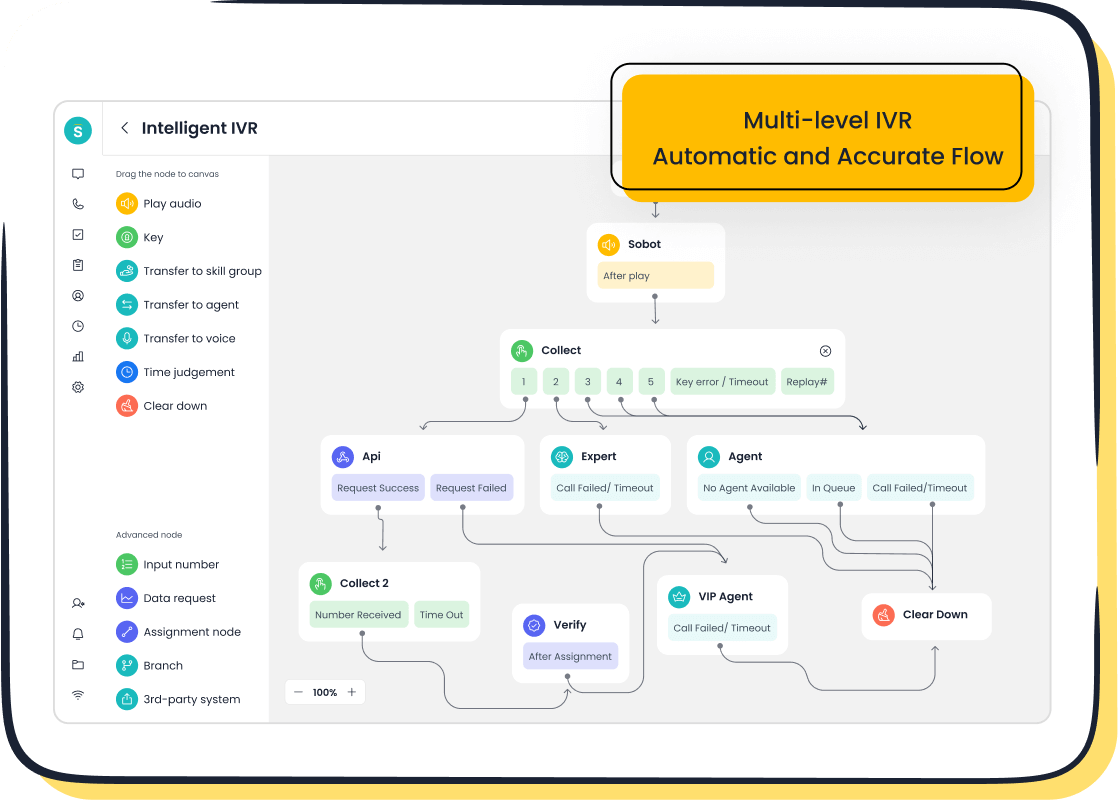
Adapting to Remote Work Trends
Cloud contact centers have become essential for businesses adapting to remote work. They allow your agents to work from anywhere with an internet connection. This flexibility ensures uninterrupted service, even when teams are distributed across different locations. With tools like unified dashboards and real-time monitoring, you can maintain productivity and deliver consistent customer interactions.
Many companies accelerated their cloud transformation during the pandemic. Studies show that 43% of businesses adopted cloud solutions faster than planned. Only 7% expect to return to traditional contact centers. By 2021, over half of organizations had already moved their contact center solutions to the cloud. These trends highlight the growing reliance on cloud-based systems for remote work.
Cloud contact centers also reduce costs and downtime. They are 27% less expensive and experience 35% less downtime compared to on-premise systems. This reliability ensures your customers receive uninterrupted support, no matter where your agents are located.
Meeting Evolving Customer Expectations
Modern customers demand fast, personalized, and seamless service. A cloud contact center helps you meet these expectations by centralizing customer interactions across multiple channels. Whether customers reach out via phone, email, or chat, your agents can access their entire interaction history in one place. This unified approach improves response times and enhances the overall customer experience.
Omnichannel support is a key feature of cloud contact centers. It allows you to provide consistent service across platforms, ensuring customers never feel disconnected. For example, if a customer starts a conversation on social media and later calls your support team, the agent can pick up right where the conversation left off. This continuity builds trust and loyalty.
Customer experience management becomes more effective with cloud contact centers. By leveraging AI and analytics, you can gain insights into customer behavior and preferences. These tools enable you to tailor your services, ensuring every interaction leaves a positive impression.
Leveraging Advanced Technologies
Cloud contact centers integrate advanced technologies like AI and automation to improve efficiency. AI-powered tools, such as chatbots and voicebots, handle repetitive tasks, freeing your agents to focus on complex issues. These tools also provide instant responses, reducing wait times for customers.
Automation enhances call routing, ensuring customers connect with the right agent or department. AI also analyzes customer data to identify trends and offer actionable insights. These features help you optimize operations and improve service quality.
By adopting advanced technologies, you can stay ahead of the competition. Cloud contact centers enable you to deliver faster, smarter, and more personalized service. This technological edge ensures your business remains relevant in 2025 and beyond.
Enhancing Business Agility and Resilience
In today’s fast-changing business environment, agility and resilience are essential for success. A cloud contact center equips your organization with the tools to adapt quickly to market shifts and unexpected challenges. By leveraging its advanced features, you can ensure your business remains competitive and responsive.
One of the key benefits of a cloud contact center is its ability to scale operations instantly. Whether you experience a sudden surge in customer inquiries or need to expand into new markets, the platform allows you to adjust resources without delays. This flexibility ensures you can meet customer demands without compromising service quality.
Another advantage lies in its robust disaster recovery capabilities. Traditional systems often struggle during outages or emergencies. In contrast, a cloud contact center operates on internet-based infrastructure with built-in redundancies. This ensures uninterrupted service, even during unforeseen events. For example, if one server goes down, the system automatically reroutes operations to another, maintaining seamless communication.
Tip: Businesses using cloud-based systems report 35% less downtime compared to on-premise solutions.
Additionally, the platform’s real-time analytics empower you to make informed decisions. You can monitor performance metrics, identify trends, and adjust strategies on the fly. This data-driven approach enhances your ability to respond to customer needs and market changes effectively.
By adopting a cloud contact center, you future-proof your business. Its scalability, reliability, and actionable insights enable you to navigate uncertainties with confidence. This agility and resilience position your organization for long-term growth and success.
Cloud Contact Centers vs. Traditional Contact Centers
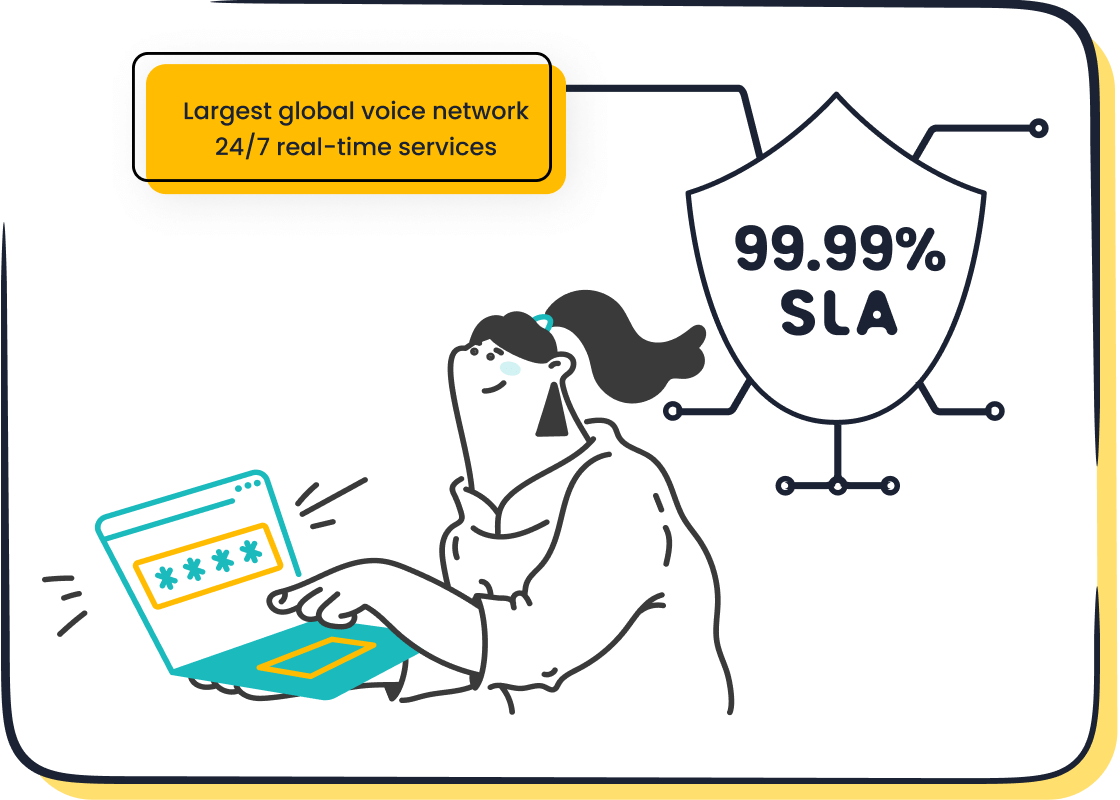
Infrastructure and Deployment Differences
Cloud contact centers operate entirely on internet-based infrastructure. This eliminates the need for physical hardware, such as servers or telephony equipment. You can access the system through any device with an internet connection. This setup allows for faster deployment and easier updates. Traditional contact centers, on the other hand, rely on on-premises hardware. Setting up these systems often involves significant time and resources.
With cloud solutions, you avoid the hassle of maintaining physical equipment. Vendors handle updates and system maintenance, ensuring your platform stays up-to-date. Traditional systems require dedicated IT staff to manage hardware and software. This difference makes cloud contact centers more efficient and less labor-intensive.
Tip: Businesses using cloud contact centers report faster deployment times and fewer technical issues compared to traditional systems.
Cost and Maintenance Comparison
Cloud contact centers are more cost-effective than traditional systems. They do not require upfront investments in hardware or IT infrastructure. Instead, you pay a predictable subscription fee based on your usage. This model reduces financial strain, especially for small and medium-sized businesses.
Here’s how cloud solutions save you money:
- No hardware purchases or installation costs.
- Lower maintenance expenses since vendors handle updates.
- Scalable pricing lets you adjust resources as needed.
Traditional contact centers involve higher costs. You must invest in hardware, hire IT staff, and cover ongoing maintenance. Scaling up requires additional equipment, which increases expenses further. Cloud solutions eliminate these challenges, offering a more budget-friendly alternative.
Note: Companies using cloud contact centers save up to 40% on operational costs compared to traditional systems.
Flexibility and Scalability Advantages
Cloud contact centers provide unmatched flexibility and scalability. You can easily add or remove agents with just a few clicks. This adaptability allows you to respond quickly to changing business needs. Traditional systems lack this flexibility. Scaling up requires purchasing new hardware and setting up additional infrastructure, which takes time and money.
The table below highlights the key differences:
| Feature | Cloud-Based Call Centers | Traditional Call Centers |
|---|---|---|
| Scalability | Easy scalability to adapt to changing needs | Limited scalability requiring significant investment |
| Flexibility | Agents can work from anywhere with internet | Stationary workplaces limit flexibility |
| Fast Deployment | Quick setup with minimal infrastructure | Time-consuming and costly to scale up |
| Global Reach | Easy expansion to global markets | Requires physical offices for expansion |
Cloud solutions also support remote work. Your agents can log in from anywhere, ensuring uninterrupted service. This flexibility boosts productivity and allows you to hire talent from a broader pool. Traditional systems tie agents to physical offices, limiting their ability to work remotely.
Pro Tip: Businesses using cloud contact centers report a 25% increase in productivity due to streamlined workflows and remote accessibility.
Customer Experience Improvements
Improving customer experience has become a top priority for businesses in 2025. A cloud contact center plays a vital role in helping you deliver faster, more personalized, and seamless interactions. By centralizing all communication channels, it ensures that your customers feel valued and heard at every touchpoint.
One of the most significant advantages of a cloud contact center is its ability to provide a unified view of customer interactions. When your agents have access to complete customer histories, they can resolve issues more efficiently. For example, if a customer contacts your team about a recurring issue, the agent can quickly review past interactions and offer a tailored solution. This approach reduces frustration and builds trust.
Did you know? Businesses that prioritize customer experience see a 60% increase in customer retention rates.
Another way cloud contact centers improve customer experience is through AI-driven tools. Chatbots and voicebots handle repetitive queries, ensuring customers receive instant responses. These tools also free up your agents to focus on more complex problems, leading to quicker resolutions and higher satisfaction rates.
Omnichannel support further enhances the customer journey. Whether your customers reach out via email, social media, or phone, they receive consistent service. This seamless experience eliminates the need for customers to repeat themselves, which is a common pain point in traditional systems.
By leveraging these features, you can achieve an enhanced customer experience that not only satisfies your customers but also fosters loyalty. A cloud contact center equips your business with the tools to exceed expectations and stay competitive in today’s fast-paced market.
Why Sobot's Cloud Contact Center Solutions Are Essential for Future Success
The Role of Sobot in Digital Transformation
Sobot plays a pivotal role in helping businesses embrace digital transformation. Its cloud contact center solutions empower organizations to modernize client communication and streamline operations. By integrating advanced capabilities like AI-powered automation and omnichannel support, Sobot ensures businesses can adapt to the fast-paced digital landscape.
Many companies have already demonstrated the importance of cloud-based solutions in their transformation journeys:
- KeyBank enhanced customer experiences and operational efficiency by adopting cloud solutions.
- Societe Generale optimized IT spending and improved scalability with hybrid cloud infrastructure.
Sobot’s solutions go beyond basic functionality. They provide tools like intelligent IVR and unified workspaces, enabling businesses to centralize customer interactions and improve service quality. With Sobot, you gain access to scalable and secure platforms that align with your digital goals.
Preparing for Future Customer Service Trends
The future of customer service demands innovation, and Sobot’s cloud contact center solutions position your business to meet these evolving needs. The market for AI customer service robots is projected to grow to $149.4 billion by 2033, with a CAGR of 28.3% starting in 2025. This highlights the increasing reliance on AI-driven capabilities to deliver efficient and personalized support.
Sobot’s solutions integrate AI tools like chatbots and voicebots, which handle repetitive queries and reduce inbound discussion volume by 20%. These capabilities ensure quick resolutions, meeting the expectations of 90% of customers who prefer first-contact problem-solving. Additionally, omnichannel communication, a feature preferred by over 75% of customers, allows you to provide seamless service across platforms.
By adopting Sobot’s solutions, you prepare your business for the future. You gain access to tools that enhance customer satisfaction, improve agent productivity, and keep you ahead in a competitive market.
Competitive Advantages for Businesses in 2025
Sobot’s cloud contact center solutions offer unmatched competitive advantages. They enable businesses to scale operations instantly, adapt to market changes, and deliver exceptional client communication. With features like global number availability and real-time monitoring, Sobot ensures your team can provide consistent service anywhere in the world.
The platform’s AI-driven capabilities give you an edge by automating workflows and analyzing customer data for actionable insights. These tools help you optimize operations and improve service quality. For example, businesses using Sobot have achieved a 97% customer satisfaction rate and a 30% increase in agent efficiency.
Sobot’s solutions also reduce costs through subscription-based pricing, eliminating the need for expensive hardware. This affordability, combined with advanced features, makes Sobot the ideal partner for businesses aiming to thrive in 2025.
Cloud contact centers are essential for businesses in 2025. They help you meet customer expectations, improve satisfaction, and enhance operational efficiency. With features like AI-powered tools and omnichannel support, these platforms transform how you interact with customers.
Sobot’s solutions deliver measurable results, such as a 15% NPS improvement and an 85% boost in satisfaction with omnichannel support.
| Metric Description | Value |
|---|---|
| NPS improvement with AI tools | 15% higher |
| Customer satisfaction with omnichannel support | 85% higher |
| Decrease in repeat calls due to AI-powered detection | 50% decrease |
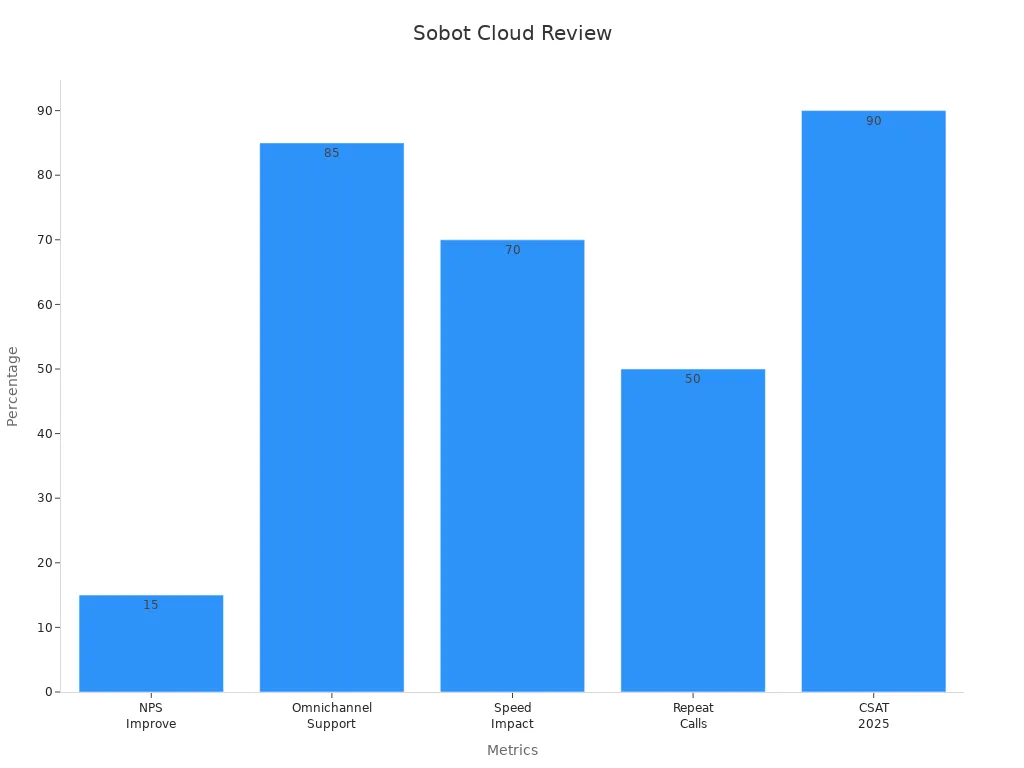
Adopting Sobot’s cloud contact center solutions ensures your business stays competitive and ready for the future.
FAQ
What is the difference between a cloud contact center and a traditional contact center?
A cloud contact center operates online, eliminating the need for physical hardware. You can access it from anywhere with an internet connection. Traditional contact centers rely on on-premises systems, which require significant hardware investments and maintenance.
Tip: Cloud contact centers are more scalable and cost-efficient than traditional systems.
How does Sobot ensure data security in its cloud contact center solutions?
Sobot uses encrypted data transfer and secure dialing to protect your information. The platform complies with global security standards, ensuring your customer data remains safe. Regular updates and monitoring further enhance security.
Note: Sobot’s system stability reaches 99.99%, ensuring reliable and secure operations.
Can Sobot’s cloud contact center integrate with my existing CRM?
Yes, Sobot’s solutions integrate seamlessly with popular CRM systems like Salesforce and Shopify. This integration allows you to access customer data in one place, streamlining your operations and improving service quality.
Pro Tip: Integration reduces repetitive tasks, boosting agent productivity by up to 30%.
What industries benefit most from Sobot’s cloud contact center solutions?
Sobot serves diverse industries, including retail, finance, gaming, education, and enterprise services. Its solutions adapt to various needs, from managing high call volumes to providing personalized customer support.
Example: Samsung improved agent efficiency by 30% using Sobot’s omnichannel solution.
How quickly can I set up Sobot’s cloud contact center?
You can deploy Sobot’s cloud contact center in just a few days. The platform’s user-friendly interface and drag-and-drop tools simplify the setup process, allowing you to start serving customers quickly.
Did you know? Businesses save weeks of setup time by choosing cloud-based systems over traditional ones.
See Also
Discovering Leading Cloud Contact Centers for 2025
Best Reviews of Cloud Contact Center Services in 2024
Evaluating the Best Contact Center Solutions for 2024
Ten Essential Steps for Omnichannel Contact Center Implementation
